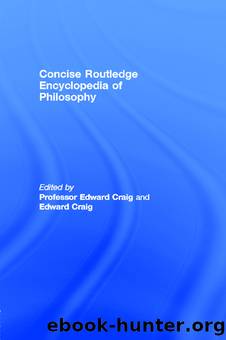Concise Routledge Encyclopedia of Philosophy by Unknown

Author:Unknown
Language: eng
Format: epub
ISBN: 978-1-134-59391-0
Publisher: Taylor & Francis (CAM)
LOGICISM
The term ‘logicism’ refers to the doctrine that mathematics is a part of (deductive) logic. It is often said that Gottlob Frege and Bertrand Russell were the first proponents of such a view; this is inaccurate, in that Frege did not make such a claim for all of mathematics. On the other hand, Richard Dedekind deserves to be mentioned among those who first expressed the conviction that arithmetic is a branch of logic.
The logicist claim has two parts: that our knowledge of mathematical theorems is grounded fully in logical demonstrations from basic truths of logic; and that the concepts involved in such theorems, and the objects whose existence they imply, are of a purely logical nature. Thus Frege maintained that arithmetic requires no assumptions besides those of logic; that the concept of number is a concept of pure logic; and that numbers themselves are, as he put it, logical objects.
This view of mathematics would not have been possible without a profound transformation of logic that occurred in the late nineteenth century – most especially through the work of Frege. Before that time, actual mathematical reasoning could not be carried out under the recognized logical forms of argument: this circumstance lent considerable plausibility to Immanuel Kant’s teaching that mathematical reasoning is not ‘purely discursive’, but relies upon ‘constructions’ grounded in intuition. The new logic, however, made it possible to represent standard mathematical reasoning in the form of purely logical derivations – as Frege, on the one hand, and Russell, in collaboration with Whitehead, on the other, undertook to show in detail.
It is now generally held that logicism has been undermined by two developments: first, the discovery that the principles assumed in Frege’s major work are inconsistent, and the more or less unsatisfying character (or so it is claimed) of the systems devised to remedy this defect; second, the epoch-making discovery by Kurt Gödel that the ‘logic’ that would be required for derivability of all mathematical truths can in principle not be ‘formalized’. Whether these considerations ‘refute’ logicism will be considered further below.
See also: ARITHMETIC, PHILOSOPHICAL ISSUES IN
Further reading
Carnap, R. (1939) Foundations of Logic and Mathematics, Chicago, IL: University of Chicago Press. (A lucid account of Carnap’s view of the relation of logic to the analysis of language, and of how mathematics – a part of the purely logical aspect of language – acquires relevance for the formulation of propositions of empirical science.)
Heijenoort, J. van (ed.) (1967) From Frege to Gödel: A Source Book in Mathematical Logic, 1879–1931, Cambridge, MA: Harvard University Press. (Includes translations of several of important works, with introductions.)
HOWARD STEIN
LOGICS, FREE see FREE LOGICS; FREE LOGICS, PHILOSOPHICAL ISSUES IN
LOGICS, INFINITARY see INFINITARY LOGICS
LOGICS, ORDINAL see ORDINAL LOGICS
LOGOS
The noun logos derives from the Greek verb legein, meaning ‘to say’ something significant. Logos developed a wide variety of senses, including ‘description’, ‘theory’ (sometimes as opposed to ‘fact’), ‘explanation’, ‘reason’, ‘reasoning power’, ‘principle’, ‘ratio’, ‘prose’.
Logos emerges as a philosophical term with Heraclitus (c.540–c.480 BC), for whom it provided the link between rational discourse and the world’s rational structure.
Download
This site does not store any files on its server. We only index and link to content provided by other sites. Please contact the content providers to delete copyright contents if any and email us, we'll remove relevant links or contents immediately.
The Secret History by Donna Tartt(16611)
Red Sparrow by Jason Matthews(4654)
Harry Potter 02 & The Chamber Of Secrets (Illustrated) by J.K. Rowling(3289)
In a Sunburned Country by Bill Bryson(2941)
Figure Drawing for Artists by Steve Huston(2792)
The Daily Stoic by Holiday Ryan & Hanselman Stephen(2703)
Drawing Cutting Edge Anatomy by Christopher Hart(2672)
The Roots of Romanticism (Second Edition) by Berlin Isaiah Hardy Henry Gray John(2565)
Japanese Design by Patricia J. Graham(2552)
Make Comics Like the Pros by Greg Pak(2421)
Stacked Decks by The Rotenberg Collection(2267)
Harry Potter and the Deathly Hallows (7) by J.K. Rowling(2213)
On Photography by Susan Sontag(2128)
Draw-A-Saurus by James Silvani(2102)
Tattoo Art by Doralba Picerno(2080)
Foreign Devils on the Silk Road: The Search for the Lost Treasures of Central Asia by Peter Hopkirk(2053)
The Traveler's Gift by Andy Andrews(2008)
Churchill by Paul Johnson(2006)
Drawing and Painting Birds by Tim Wootton(1997)
